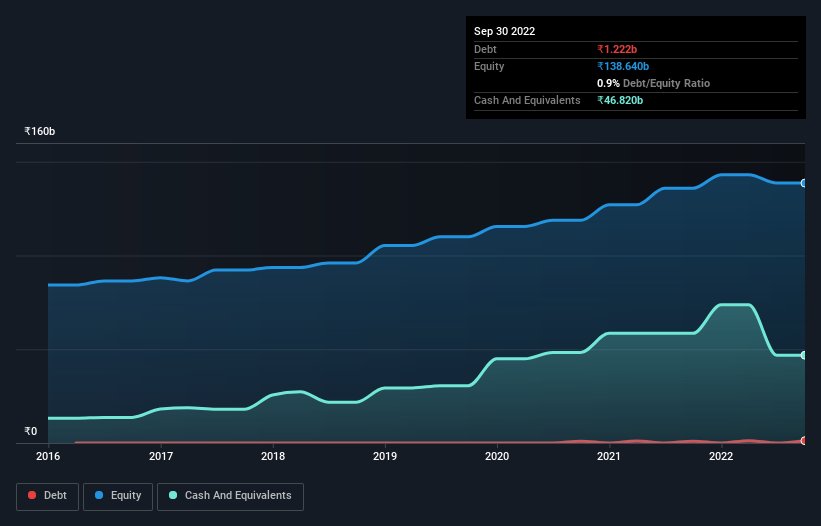The external fund manager backed by Berkshire Hathaway's Charlie Munger, Li Lu, makes no bones about it when he says 'The biggest investment risk is not the volatility of prices, but whether you will suffer a permanent loss of capital.' It's only natural to consider a company's balance sheet when you examine how risky it is, since debt is often involved when a business collapses. We can see that ACC Limited (NSE:ACC) does use debt in its business. But is this debt a concern to shareholders?
When Is Debt A Problem?
Generally speaking, debt only becomes a real problem when a company can't easily pay it off, either by raising capital or with its own cash flow. Part and parcel of capitalism is the process of 'creative destruction' where failed businesses are mercilessly liquidated by their bankers. However, a more common (but still painful) scenario is that it has to raise new equity capital at a low price, thus permanently diluting shareholders. Having said that, the most common situation is where a company manages its debt reasonably well - and to its own advantage. When we examine debt levels, we first consider both cash and debt levels, together.
Our analysis indicates that ACC is potentially overvalued!
What Is ACC's Net Debt?
You can click the graphic below for the historical numbers, but it shows that as of June 2022 ACC had ₹1.22b of debt, an increase on ₹990.7m, over one year. But on the other hand it also has ₹46.8b in cash, leading to a ₹45.6b net cash position.

How Strong Is ACC's Balance Sheet?
According to the last reported balance sheet, ACC had liabilities of ₹59.9b due within 12 months, and liabilities of ₹7.20b due beyond 12 months. On the other hand, it had cash of ₹46.8b and ₹10.9b worth of receivables due within a year. So its liabilities outweigh the sum of its cash and (near-term) receivables by ₹9.36b.
This state of affairs indicates that ACC's balance sheet looks quite solid, as its total liabilities are just about equal to its liquid assets. So while it's hard to imagine that the ₹489.4b company is struggling for cash, we still think it's worth monitoring its balance sheet. Despite its noteworthy liabilities, ACC boasts net cash, so it's fair to say it does not have a heavy debt load!
It is just as well that ACC's load is not too heavy, because its EBIT was down 60% over the last year. Falling earnings (if the trend continues) could eventually make even modest debt quite risky. There's no doubt that we learn most about debt from the balance sheet. But ultimately the future profitability of the business will decide if ACC can strengthen its balance sheet over time. So if you want to see what the professionals think, you might find this free report on analyst profit forecasts to be interesting.
Finally, while the tax-man may adore accounting profits, lenders only accept cold hard cash. ACC may have net cash on the balance sheet, but it is still interesting to look at how well the business converts its earnings before interest and tax (EBIT) to free cash flow, because that will influence both its need for, and its capacity to manage debt. During the last three years, ACC produced sturdy free cash flow equating to 56% of its EBIT, about what we'd expect. This cold hard cash means it can reduce its debt when it wants to.
Summing Up
While it is always sensible to look at a company's total liabilities, it is very reassuring that ACC has ₹45.6b in net cash. So we are not troubled with ACC's debt use. The balance sheet is clearly the area to focus on when you are analysing debt. But ultimately, every company can contain risks that exist outside of the balance sheet. For instance, we've identified 2 warning signs for ACC (1 makes us a bit uncomfortable) you should be aware of.
If, after all that, you're more interested in a fast growing company with a rock-solid balance sheet, then check out our list of net cash growth stocks without delay.
New: Manage All Your Stock Portfolios in One Place
We've created the ultimate portfolio companion for stock investors, and it's free.
• Connect an unlimited number of Portfolios and see your total in one currency
• Be alerted to new Warning Signs or Risks via email or mobile
• Track the Fair Value of your stocks
Have feedback on this article? Concerned about the content? Get in touch with us directly. Alternatively, email editorial-team (at) simplywallst.com.
This article by Simply Wall St is general in nature. We provide commentary based on historical data and analyst forecasts only using an unbiased methodology and our articles are not intended to be financial advice. It does not constitute a recommendation to buy or sell any stock, and does not take account of your objectives, or your financial situation. We aim to bring you long-term focused analysis driven by fundamental data. Note that our analysis may not factor in the latest price-sensitive company announcements or qualitative material. Simply Wall St has no position in any stocks mentioned.
About NSEI:ACC
ACC
Engages in the manufacture and sale of cement and ready-mix concrete in India.
Undervalued with excellent balance sheet.
Similar Companies
Market Insights
Community Narratives





